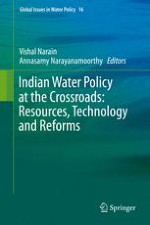
2016 | OriginalPaper | Buchkapitel
1. Introduction: Towards a Discursive Analysis of Indian Water Policy
verfasst von : Vishal Narain
Erschienen in: Indian Water Policy at the Crossroads: Resources, Technology and Reforms
Aktivieren Sie unsere intelligente Suche, um passende Fachinhalte oder Patente zu finden.
Wählen Sie Textabschnitte aus um mit Künstlicher Intelligenz passenden Patente zu finden. powered by
Markieren Sie Textabschnitte, um KI-gestützt weitere passende Inhalte zu finden. powered by